On the Record with Pomona-Pitzer Water Polo’s Alex Rodriguez
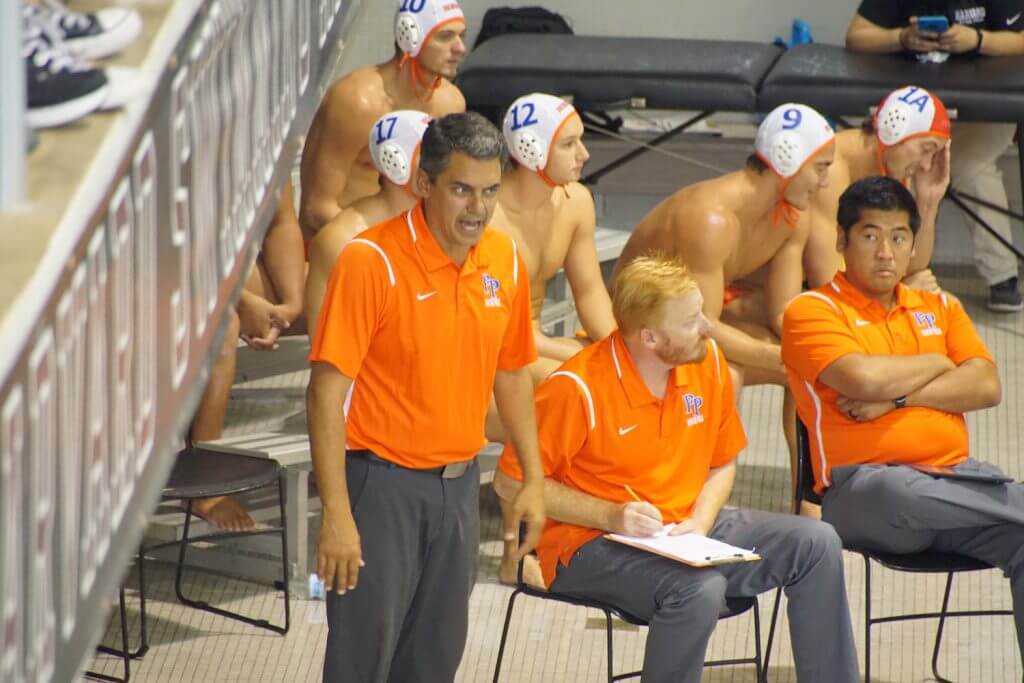
By Michael Randazzo, Swimming World Contributor
One of the brightest young minds in American water polo is not at USC. Or Stanford. Or Cal or UCLA. Alex Rodriguez—known as “A-Rod,” just like the notorious former baseball player—is head coach for the men’s and women’s teams at Pomona-Pitzer, a Division III program located 35 miles east of Los Angeles.
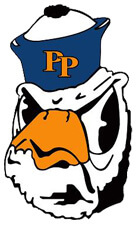
Cecil the Sagehen
During his decade in Pomona, Rodriguez’s teams have enjoyed noteworthy success, including multiple trips to the NCAA men’s and women’s tournaments. Following a year-long sabbatical—including a trip to the Rio Olympics—as the top assistant to Dejan Udovicic, head coach for the U.S. Men’s Senior National Team, Rodriguez returned just in time to guide the Sagehens to the 2016 NCAA Men’s Water Polo Championship. In the spring of 2017 Pomona-Pitzer’s women also qualified for NCAAs, their fourth appearance in six years.
In many ways Rodriguez has been preparing his whole life to be one of the nation’s top coaches. A walk-on at Pepperdine who became an integral part of the Waves’ 1997 NCAA championship team, he graduated to Terry Schroeder’s assistant, a position that led directly to his current Pomona-Pitzer position. Hard work and choice opportunities have led him up the USA Water Polo ladder from youth coach to a prominent role on Udovicic’s staff.
With his team out East for the Harvard Invitational, Rodriguez spoke with Swimming World about his learning curve in the sport, a young U.S. men’s squad’s myriad challenges, his Sagehens’ quest to again make waves in the Southern California Intercollegiate Athletic Conference and how tenacity, diligence and devotion have given him a prominent role with Team USA as they look to qualify for the 2020 Games in Tokyo.
You are “Alex Rodriguez,” and there are many people with that name. But there’s one Alex Rodriguez—commonly known as “A-Rod—who is universally known for his major-league baseball career. Is it tough to live in the enormous shadow he casts?
A funny story is I have a high school friend, Matt Wise, who played major league baseball. When he was a senior in high school he went to travel ball and met Alex. He came back and told me: “There’s a guy with the exact same name as you and he’s great at baseball!”
I laughed it off. I just figured he’d never make it big because it’s so hard for baseball players.
And now you go by “A-Rod”?
I used to not like people to call me A-Rod, but I just gave up. And now both of my kids are A-Rod: Austin Rodriguez and Addison Rodriguez.
You were a successful player at Bonita High School and at Citrus Junior College who walked-on at Pepperdine.
I was a 2-meter man in high school. What 2-meter man doesn’t want to be coached by Terry Schroeder?
I went there on a down year. Jack [Kocur] and Alan Herrmann red-shirted, I transferred in from junior college. It was great. I don’t know if I would have gotten the playing time if it wasn’t for this scenario. I was the leading scorer my junior year and an All-American.
Senior year was amazing. Merrill [Moses] was a sophomore; Jack and Alan came off redshirt. Jeremy Pope came in and suddenly we went from really bad to really good.
We started the season ranked fourth or fifth and had to play Stanford at home, and then again a few days later at the SoCal tournament. We beat them both times and then we had to play Cal, who was #1 that year to start off.
I still remember that game against Cal [an 8-6 Pepperdine win]—that was the first time we really believed we could win the national championship. We rode that for a long time, only lost one game until Mountain Pacific [Sports Federation tournament] and lost three games all year. It was pretty special for us.
We played USC in the NCAA final [an 8-7 OT win by the Waves]—and just had our twenty-year reunion. Most of the players came back. It was great to see everyone again and be honored during a Pepperdine vs. UCLA game.
What was it like being coached by Coach Schroeder?
Terry is such a good guy. I’ve had some very fortunate opportunities and some amazing people in my life as coaches.
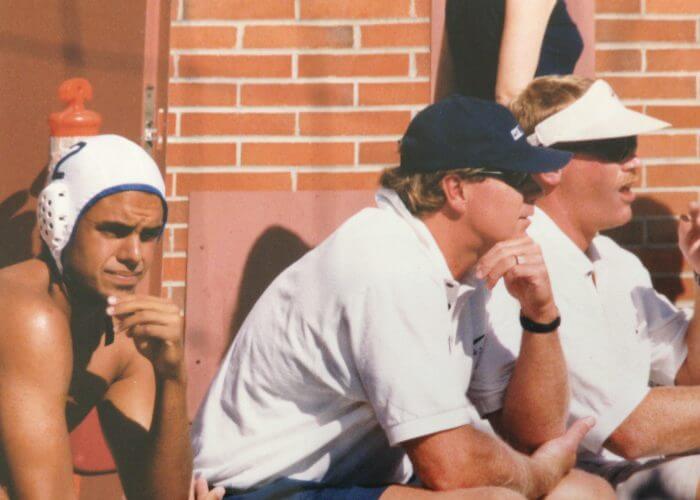
Future coach with mentor, Terry Schroeder. Photo Courtesy: Alex Rodriguez
He has a command of men that I haven’t seen anyone else have. He makes you feel like you want to play for him. I learned a lot about presence and leadership from Terry.
[After graduation] I came back and was his assistant for three years. That was a great experience for me because Terry’s a chiropractor, too, and I was able to do a lot of the management stuff for the team [including] budgets and travel arrangements when he was out.
As you’ve moved up in esteem within USA Water Polo, you’ve become one of the leading decision-makers for the U.S. Senior Men’s Team.
I owe Coach Udovicic a lot. He looked at my resume and said: “You coach here, you coach here, you had success here; you’re a coach!”
I was appreciative, but honestly I’ve worked my ass off to get where I’m at. I was hired as a youth junior coach—and I expected as a youth and junior coach to be at every national team practice I can.
One of the things I feel in our sport is that professional development is non-existent. We had Nikola Malezanov of Washington Jefferson come to Australia, we had Bryan Suhovy of Fresno Pacific as a videographer for our Russia trip. Teddy Minnis from Harvard was with us for world championships. They got to sit in on meetings and get to absorb [things]. We need more of these opportunities in our sport.
How can we make certain that our men’s senior team is fully prepared to win?
I was talking to Tony Azevedo about the Final Six [European professional championship] and asked him: “How many American players in the last 20 years have played in the Final Six?”
We were guessing three. Did you know that the Serbians had 11 or 12 of the 13 on their [2017 FINA World Championship] roster that played in the 2017 Final Six?
It’s simple: it’s about experience and playing. Americans play a lot while we’re in college, though in spring we’re not playing. And it’s not like football where college players can make a lot of money. These kids have to study. Several college players finished finals in mid-June and then joined us. What kind of shape were they in?
I know we lost to Japan. And I don’t really have an answer [for that]. I’m not a person to ever pass the buck.
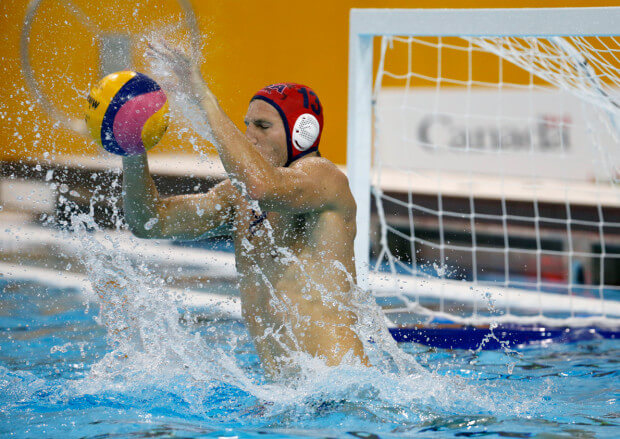
McQuin Baron. Photo Courtesy: Julio Cortez
Except for that game, we had a pretty successful summer. We went into a shootout with Serbia; McQuin Baron played out of his mind in that game. We went into a shootout with Italy. We handled Russia—and if you take away some of the extracurricular activity we had an opportunity to win by seven.
All of us own up to what happened with Japan. If we had our more experienced players, and if there was more motivation for those experienced players to play—but also a better system for us. European Championships is a fantastic tournament. It’s such an experience, especially before the Olympics.
I’m a simple person; you train, you play. How you train is how you play. You put yourself in pressure situations, sometimes you fail, sometimes you succeed, you keep doing that until you’re good at it.
I’m an NCAA champion and I can tell you; the Olympics for players in other countries is a whole different kind of pressure. If they don’t do well in the Olympics representing their country their performance is connected to their contract for a professional club.
This is the problem: I don’t see our guys getting enough high-level competition consistently throughout the year. High, high level competition, like where you’re “living and dying,” based upon the outcomes.
If the question is how to get our players consistent, high-level competition, what does it take for the U.S. to get players in the top professional leagues in Europe?
I feel like things are very easy to see, if you really look at them. The salaries [in European professional water polo] are going to affect more people from Australia and U.S. The cost of living here is way greater than living in Hungary and Serbia.
I just don’t know if our kids want to go live in Europe.
One thing I’m disappointed about [is] my parents are from Cuba. My mom wanted to have me here. I’ve always been brought up with love for this country.
Regardless of how I felt about anybody, I would always support the national team. That’s my flag and this is the country that’s given my family a fantastic life.
Representing our country in Brazil was the proudest moment in my life.
That’s what I always preach and that’s what I do. I had an opportunity to coach with the national team and I’ve done everything I can to take it and learn from it and get better. I’m continually trying to get better. And now I’m trying to help my colleagues get better.
We can talk about how great Adam Krikorian is or Dejan is but, there has to be a solid base.
And our base as a sport can be a lot higher. I love this sport and I coach it all the time. I would love to see it better in this country. I’d like to see our athletes really have an opportunity—I’d like to see McQuin play in four or five Olympics, if he wants to, and not have to sacrifice financially to do it.
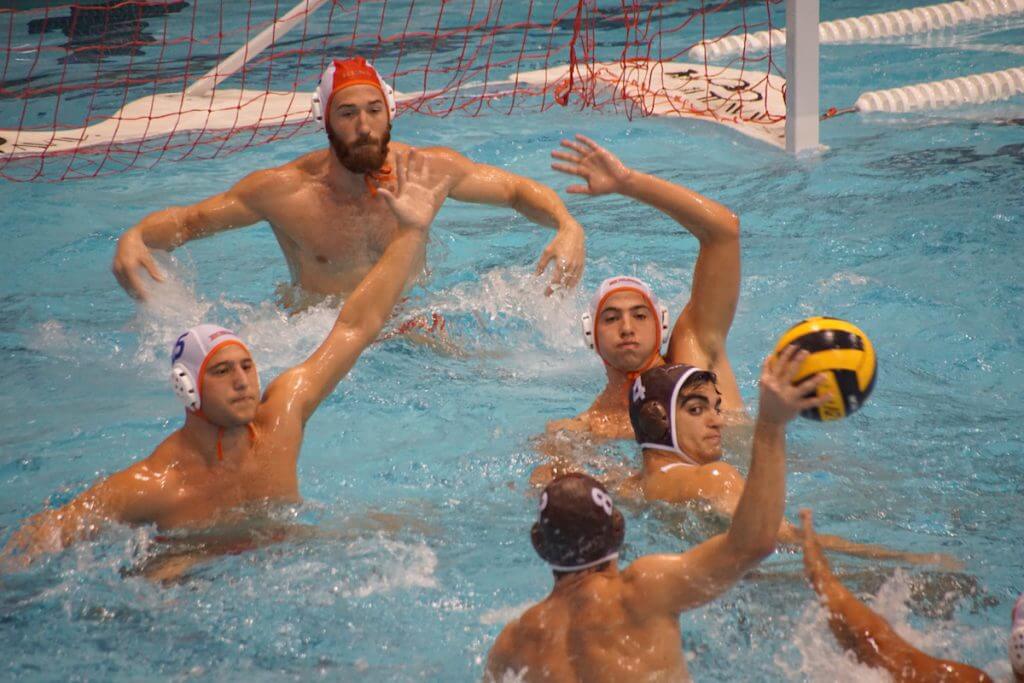
Pomona-Pitzer in action versus Brown. Photo Courtesy: Andrea Gross
Bringing it back to the U.S. college game, you’ve got two teams—men and women—that you coach at Pomona-Pitzer. Both teams have a pathway to NCAA championships. What will it take for your men to return to the tournament?
This is probably my best team individually because of my athletic director, Lesley Irvine, who has changed everything for me at Pomona-Pitzer. More than anything, she brought passion to me [when] she asked: “What can I do to help you win?”
I didn’t have that before.
For us it’s winning the conference and getting the bid. My goal is to keep moving up the ladder. You can see it in my freshmen who came in last year: Joe Schafer and Jacob Niskey. They produced right away and they give us some depth.
This year with Dylan Elliot and Adam Gross we have water polo players. I used to have players that played water polo.
I’m excited. I have great kids who want to learn, want to get better. Some people wonder if I struggle going from Tony Azevedo to [our kids] and I don’t. I just love teaching the game. I love individually breaking it down. I love learning.




My goodness :/
Hi:
I’ll take this as a positive comment! This interview w/Coach Rodriguez was one of the more enjoyable – and collaborative pieces I’ve ever done. I do hope you (and others) enjoyed his candor.
Your correspondent
We are very proud of all that Alex has done for Pomona water polo. He is a great and inspirational coach.
Dear Steve:
Thank you for your comments. Based upon my interview w/Coach Rodriguez, he truly is one of our country’s great coaches (I felt that “young” might give a bit of perspective). I was greatly impressed with his passion and dedication (which of course you / others @. Pomona-Pitzer know quite well).
All the best for your drive to a SCIAC title.
Your correspondent